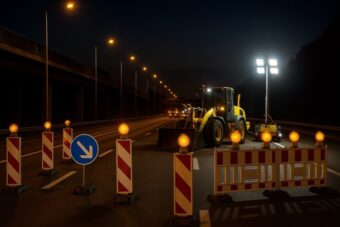A100 in Berlin opens: €721 million extension sparks protests

On 27 August 2025, after twelve years of construction, the 16th section of Berlin’s city motorway A100 was officially opened. Governing Mayor Kai Wegner (CDU) and Federal Transport Minister Patrick Schnieder (CDU) cut a symbolic black-red-gold ribbon at midday. By the afternoon, traffic began flowing on the new stretch between Neukölln and Treptow. The 3.2-kilometer extension cost around €721 million and runs largely in a trench up to seven meters deep. This was reported by G.business citing rbb24.
The opening ceremony took place at the Estrel Hotel on Sonnenallee and was accompanied by protests. Around 150 people demonstrated outside, while earlier in Treptow about 100 opponents of the project had gathered. A total of 280 police officers were deployed. Police confirmed the rallies remained peaceful, although there had been a paint attack the night before on the Dieselstraße bridge, where two buckets of pink paint were poured onto the road. The traces were removed in the morning.
Wegner defended the multibillion-euro investment on rbb24 Inforadio: “The city motorway takes traffic out of residential areas. This relieves local residents, and that is my goal.” In the evening, during the Abendschau program, he emphasized that the full benefit would only be achieved with the planned 17th construction phase. The planning approval process is already underway. “It is important that the motorway does not end in the middle of a residential district. That we must extend this efficient route, I fully agree with the Federal Minister,” Wegner said.
The opposition voiced sharp criticism. Tobias Schulze, head of the Left Party’s parliamentary group, called it “the most absurd and most expensive road in Germany.” Given the climate crisis and heat waves, he said Berlin needed a greener city instead of another “concrete highway.” The Greens also demanded an end to what they called “fantasies of further extensions.” Antje Kapek stated: “A motorway so unpopular that it has to be opened secretly in a hotel says everything.”
The AfD also weighed in. Its parliamentary managing director Rolf Wiedenhaupt described moving the event into a hotel as an “admission of failure” by the mayor. He accused Wegner of cozying up too much to the Left and Greens and doing little against what he called “left-wing extremist violence” in Berlin.
With the opening of the 16th section, the A100 now ends at the Treptower Park interchange. Whether and when the 17th section will follow remains uncertain – but the A100 continues to symbolize the clash between infrastructure expansion and climate policy in Berlin.
Stay connected for news that works — timely, factual, and free from opinion — and insights that matter now: Qatar’s THAAD Gamble: Can BAE’s 1,000thSeeker Redefine Gulf Security
